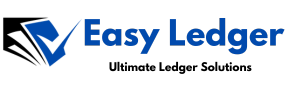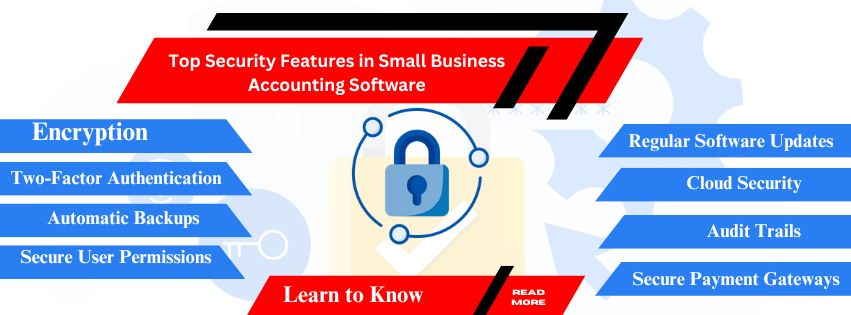When managing small business finances, security should always be a top priority. Accounting software often holds sensitive financial information that is vital to your business. If you’re looking for the best protection, it’s essential to choose software with strong security features. In this article, we will explore the top security features in small business accounting software should have to keep your financial data safe and secure.
Why Security Matters in Small Business Accounting Software
Small businesses are frequent targets of cyberattacks. Hackers often target smaller companies because they lack the security measures larger companies invest in. Without proper security, sensitive financial data like invoices, payroll, and tax records can be exposed or stolen. This can lead to serious financial loss, reputational damage, and legal consequences.
Top Security Features in Small Business Accounting Software
Small business accounting software must provide strong security features to protect against these threats. But what exactly should you look for in terms of security? Let’s dive into the key features you should prioritize.
1. Encryption
Encryption is one of the most important security features for any software, especially accounting tools. It protects data by converting it into a code that can only be unlocked with a specific key. This ensures that even if your data is intercepted, it cannot be read or misused.
Most small business accounting software should offer encryption for data in transit and at rest. This means that whether your data is being sent over the internet or stored on servers, it remains safe from unauthorized access.
Why it matters: Encryption prevents hackers from accessing sensitive financial information like bank details or employee payroll data.
2. Two-Factor Authentication (2FA)
Two-factor authentication (2FA) is an additional layer of security. In addition to entering your password, you must also provide another piece of information, such as a code sent to your phone or email.
This feature makes it harder for unauthorized users to access your accounting software, even if they know your password. It’s one of the most effective ways to add an extra layer of protection.
Why it matters: 2FA reduces the chances of someone gaining unauthorized access to your financial information.
3. Automatic Backups
Regular backups are crucial for protecting your financial data. Small businesses rely on accounting software to store everything from transaction records to tax information. If your system crashes or data is accidentally deleted, backups ensure you don’t lose vital information.
Look for software that automatically backs up your data to the cloud. This feature eliminates the need for manual backups, which can be time-consuming and easily forgotten.
Why it matters: Automatic backups safeguard your data against loss, whether due to a system failure or human error.
4. Secure User Permissions
Small businesses often have multiple people accessing accounting software. This makes it crucial to have a way to control who can access certain features and data.
Look for accounting software that allows you to set user permissions. You should be able to control who can view, edit, or delete specific financial data. For example, you may want to allow your accountant to view tax reports but not edit payroll information.
Why it matters: Managing user permissions helps ensure that only authorized personnel have access to sensitive data.
5. Regular Software Updates
Security vulnerabilities are often discovered after software is released. Software developers regularly update their products to fix these vulnerabilities and protect against new threats. Regular updates are essential for keeping your accounting software secure.
Most software providers will notify you when updates are available. It’s important to install these updates as soon as possible to stay protected.
Why it matters: Regular updates help prevent hackers from exploiting known vulnerabilities in your software.
6. Cloud Security
Cloud storage allows you to store data online instead of on local servers. While this is convenient, it also comes with risks. Look for accounting software that uses strong cloud security protocols like secure data centers and encryption.
Also, make sure the software provider complies with industry security standards such as the General Data Protection Regulation (GDPR) or the Payment Card Industry Data Security Standard (PCI DSS).
Why it matters: Cloud security protects your data from physical theft, natural disasters, and unauthorized access.
7. Audit Trails
An audit trail is a record of all actions taken within the accounting software. It tracks who made changes, what changes were made, and when. This feature is essential for detecting fraud or errors.
Audit trails provide visibility into user activity, helping you quickly spot unusual behavior or unauthorized access. If there’s a security breach, an audit trail can help you trace the source of the problem.
Why it matters: Audit trails help ensure accountability and make it easier to investigate security incidents.
8. Secure Payment Gateways
If your accounting software integrates with payment systems, make sure it supports secure payment gateways. Payment gateways like PayPal, Stripe, or Square use encryption and fraud detection to secure payment transactions.
Using secure payment gateways reduces the risk of credit card fraud and protects customer financial information.
Why it matters: Secure payment systems protect both your business and your customers from fraud.
9. Role-Based Access Control
This feature allows you to assign different roles to users within your accounting software. Each role has specific permissions, limiting what a user can see and do. For example, the owner might have full access to all financial data, while a clerk might only have access to invoice creation.
By controlling user roles, you limit access to sensitive financial data, reducing the risk of unauthorized use or errors.
Why it matters: Role-based access control ensures that only the right people have access to the right data.
10. Real-Time Alerts
Real-time alerts notify you of any suspicious activity or potential threats. These can include login attempts from unknown locations, unusual transaction amounts, or changes to critical data. Alerts can be sent via email or text, allowing you to take quick action if needed.
Real-time alerts help you stay on top of security threats and respond quickly to prevent data loss or theft.
Why it matters: Immediate alerts allow you to act quickly before a security breach can cause significant damage.
11. Data Recovery Features
A disaster recovery plan should be in place for any business, including small businesses. Data recovery features in accounting software allow you to restore your information in case of a cyberattack, natural disaster, or human error.
Look for software that provides easy recovery options, such as restoring data from a backup or rolling back to a previous version.
Why it matters: Data recovery ensures that your business can continue operating even after an unexpected event.
Statistics to Consider
According to a report by Cybersecurity Ventures, small businesses are 350% more likely to be targeted by cybercriminals than larger companies. Another study by QuickBooks found that nearly 60% of small businesses use online accounting software to track their finances, making software security a top priority for business owners.
FAQs
1. How can I protect my small business accounting data?
Ensure your accounting software has strong encryption, two-factor authentication, and automatic backups. Regular updates and secure payment gateways also help protect your data.
2. What is two-factor authentication?
Two-factor authentication (2FA) requires two forms of identification to access your software. This could include a password and a code sent to your phone.
3. Why should I use cloud-based accounting software?
Cloud-based software offers secure data storage and easy access from anywhere. It also typically provides automatic updates and strong encryption.
4. What is an audit trail in accounting software?
An audit trail records all user actions within the software. It helps track changes and identify any unauthorized activity or errors.
5. How often should I back up my accounting data?
You should back up your data regularly, ideally daily. Many modern accounting tools offer automatic backup options to simplify this process.
Conclusion
Selecting the right accounting software is crucial for your small business. Security features like encryption, two-factor authentication, and real-time alerts protect your data and provide peace of mind. By choosing software with robust security measures, you safeguard your business from potential threats and ensure that your financial information stays secure.

